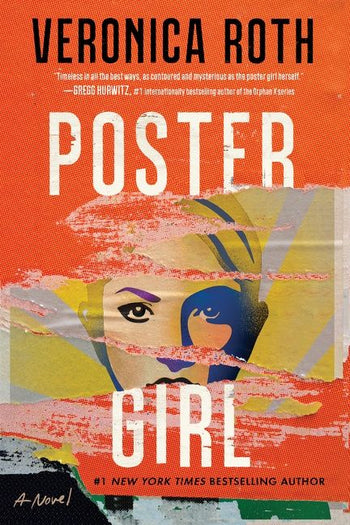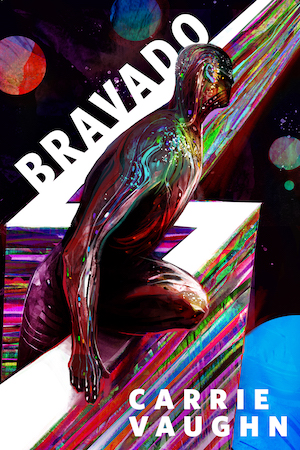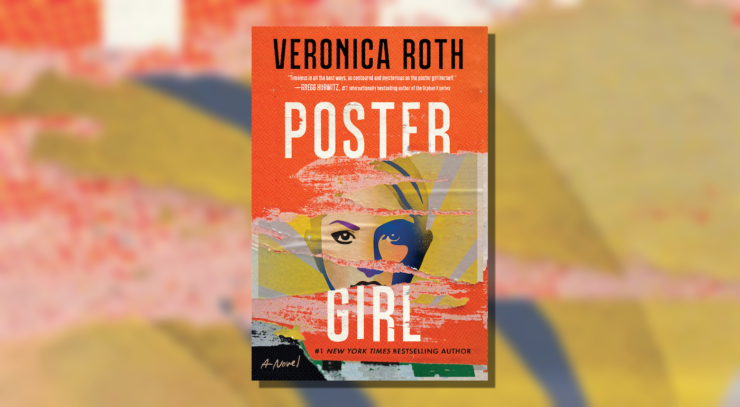Sonya, former poster girl for the Delegation, has been imprisoned for ten years when an old enemy comes to her with a deal: find a missing girl who was stolen from her parents by the old regime, and earn her freedom.
We’re thrilled to share an excerpt from dystopian science fiction novel Poster Girl by Veronica Roth, out from William Morrow on October 18.
WHAT’S RIGHT IS RIGHT.
Sonya Kantor knows this slogan—she lived by it for most of her life. For decades, everyone in the Seattle-Portland megalopolis lived under it, as well as constant surveillance in the form of the Insight, an ocular implant that tracked every word and every action, rewarding or punishing by a rigid moral code set forth by the Delegation.
Then there was a revolution. The Delegation fell. Its most valuable members were locked in the Aperture, a prison on the outskirts of the city. And everyone else, now free from the Insight’s monitoring, went on with their lives.
Sonya, former poster girl for the Delegation, has been imprisoned for ten years when an old enemy comes to her with a deal: find a missing girl who was stolen from her parents by the old regime, and earn her freedom. The path Sonya takes to find the child will lead her through an unfamiliar, crooked post-Delegation world where she finds herself digging deeper into the past—and her family’s dark secrets—than she ever wanted to.
Outside, the city is shrouded in fog—not the heavy fog of pollution, but the mist of a typical morning. The streets are busy and there are signs of disrepair everywhere, as if nothing has been mended since the day she stepped into the Aperture. Perhaps nothing has. A stoplight dangles from a pole, precarious, its light flickering. A crack in the road has grown so wide it could swallow a man; a woman steers her child around it. The Delegation was good at keeping things tidy, but the Triumvirate, it seems, is not.
The train brakes, and a robotic voice calls out Sonya’s stop. She steps onto the sagging platform alone. She’s been here so many times—she took the HiTrain to school every morning, and to Aaron’s every other day, and to her friend Tana’s on Saturday afternoons to see C-rated movies at the theater near her house. It made her feel grown up, riding the train alone; she pretended she was on her way to work, or to pick up her kids from school.
Now she feels ancient. A specter haunting a graveyard.
She descends the steps to street level. Everywhere else, the disarray of the city seemed to be the result of bad behavior; here, it’s due to neglect. The stores—once a row of charming boutiques and coffeehouses—are boarded up. The grass in the parkways is wild and tall; the tree branches tangle in the power lines and hang heavy over the street. She steps over a fallen streetlight, bits of glass crunching under her feet.
Buy the Book


Poster Girl
She remembers children in strollers, wearing hats to protect their faces from the sun; she remembers couples walking shoulder to shoulder, their knuckles brushing as their arms swung; she remembers dogs sniffing at front gates and the corners of fences. But this is no longer a place for those ordinary things. She turns at the next intersection and walks down the street where her family lived.
There’s debris here, too, but a different kind. She steps over a broken fishing pole, a knitting bag with shiny needles poking out of it, a children’s bicycle with no tires. She recognizes the tattered frame of a brocade sofa from the Perez house, turned upside down on their front lawn, now obviously a home for small mammals. She stops in the middle of the street to look at the front doors torn off their hinges on each side, the broken windows, the charred remains of second stories.
Her family fled early in the uprising. Her father came to them late at night and told them to pack a change of clothes and a toothbrush. They drove down the street with the headlights off, only the car dashboard and their Insights glowing—
Sonya keeps walking.
The Kantor house is made of red brick. Two stories high, with fir trees at the edges of the property. The right side of the house is half-collapsed, the second floor tumbling into the first. Sonya’s room and the guest room fold in on themselves.
Two white pillars frame the front door, which rests against the side of the house, where the lilac bushes used to be. Broken furniture is strewn over the lawn, like entrails spilling from an animal carcass. She stands on her tiptoes near the front door to feel along the frame for the spare key. It’s there, covered in dirt, paint from the frame sticking to it. She slides it into her pocket.
The rugs are gone, the walls cracking and flaking, the furniture absent or broken. She doesn’t trust the steps that lead upstairs. She wanders into the formal dining room, to the left, where the tabletop has shattered, leaving beads of glass all over the wood floor. The metal frame stands unaffected.
All the drawers in the built-in cabinet along the far wall are open.
But something in one of them catches the light—one of the napkin rings her mother saved from her first dinner party, a simple yellow loop made of plastic. It looks like something for a baby to teethe on. Her mother always talked about how determined she was to make things “nice” even when they were young and poor—plastic napkin rings, polyester napkins instead of paper, matching melamine plates. There’s no excuse for a lack of effort, she liked to say, one of the phrases Sonya repeated to herself when she saw unkempt or disruptive people.
She keeps moving until she reaches the threshold of her father’s office. She wasn’t allowed to go in, even as a teenager. But it’s only wreckage now. There are books everywhere, left to rot on the hardwood. His desk has been ripped apart, files everywhere, shelves broken, keepsakes smashed. The clay dish she made him in primary school, a cradle of leaves painted deep green to match his walls, is in pieces on the floor. She crouches to pick them up, one by one.
Near the edge of the desk is the poster, encased in glass. what’s right is right. He kept it hanging right in front of him so she could watch him work—that’s what he said, anyway. She stays for a long time in a crouch, the pieces of the dish in her hands, her adolescent face glaring back at her in grayscale. Someone sprayed a red X on the glass, but she can still see through it.
Her father was the one who asked her to sit for the poster. Susanna didn’t like it. She grumbled about it for days. But Sonya had squealed with excitement at the thought of her face being all over the city.
She stands and leaves the office. The rooms are arranged in a square, connected by hallways, so she walks right through the kitchen, with its broken tiles and collapsed cabinets, to the laundry room, half-buried in rubble, the washing machine unperturbed.
She collects things as she goes: a spoon from the wreck of the kitchen, one of Susanna’s guitar picks wedged between the floorboards, a bottle cap her father saved from his first date with her mother. She notes the big homescreen—a wide glass panel designed to sync with all their Insights—in the living room, bashed in repeatedly with a blunt object, and the spray paint on the wall in the foyer that reads delegation scum. That, she looks at for a long time.
Excerpted from Poster Girl, copyright © 2022 by Veronica Roth.










